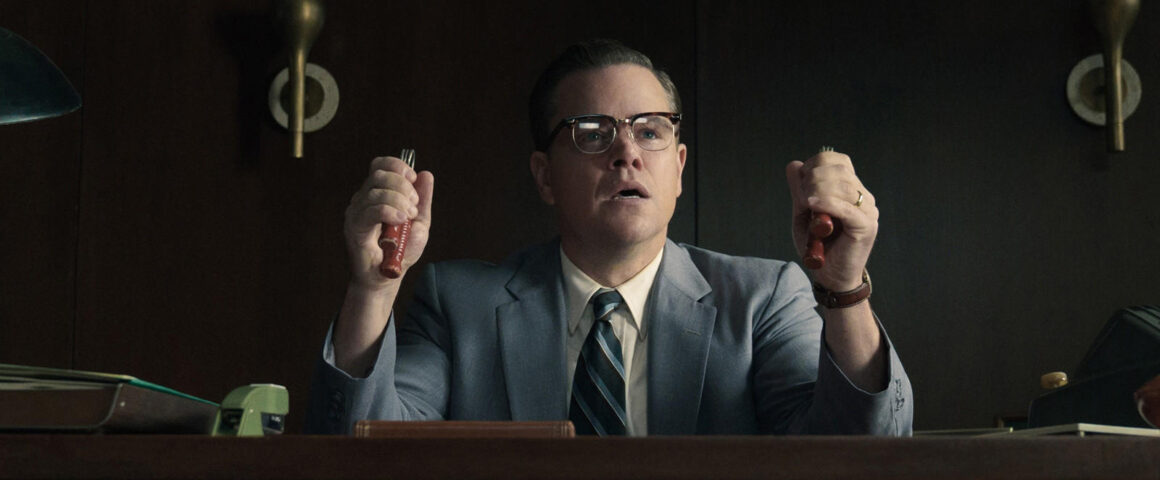Suburbicon, the worst and even worse timed movie of the year, feels like someone put “Pleasantville,” “Fargo,” and the Vault Tech initiation videos from the Fall Out video game franchise into a blender in a grotesque, heavy on the white-splaning approximation of the recipe for “Do the Right Thing.”
The resulting slop, entirely missing ingredients such as solid plot or characters with distinct personalities, motivations, or any form of growth whatsoever, makes “Crash” look like an elegant political treatise and “American History X,” subtle. Mess is too generous of a word for Suburbicon and disaster, not nuanced enough.
And speaking of nuance — in the very beginning, Suburbicon seems like it’s preparing you for an acrid critique of suburban social politics both between and among families and the oft-criticized realities of the fabled American Dream, particularly in juxtaposition to the Civil Rights Movement. Even when we hear white voices say that white Americans “favor integration with the negroes when they prove they’re ready for it,” because “we’ve come too far to move backwards now” in the Vault Tech rip off part, one can still defensibly expect such a satire to be on the way. Within mere minutes, however, it becomes abundantly clear that while a bunch of issues will be thrown at audiences, ostensibly for baseless shock value, none of them are going to be even sort of analyzed, challenged, or explored.
What actually happens plot-wise (though I hesitate to even use that term, seeing as how plots generally include things like logical sequences of interconnected events), is that a black family, the Meyers, moves into a white suburban neighborhood in the late 1950s at around the same time that a combination home invasion and murder (and something even more nefarious) occurs.
Not only do these two events take place in the same neighborhood (obviously named Suburbicon and trying — and failing — to evoke the same strangely perfect vibe as “Edward Scissorhands” or “The Stepford Wives”), but on opposite sides of the exact same block, with adjacent backyards.
Further, literally the only person in Suburbicon — the neighborhood or the film — to show any member of the Meyers family any modicum of kindness is Nicky (Noah Jupe, “That Good Night”), the only child of the Lodges (Gardner [Matt Damon, “Jason Bourne”] and Rose [Julianne Moore, “Kingsman: The Golden Circle”]), the family who experiences the aforementioned attack. And even this kindness exists primarily in two scenes, one at the very beginning and one at the very end, in which Nicky and the Meyers’ only child, Andy (Tony Espinosa, “The Birth of a Nation”), toss a baseball back and forth over their shared fence.
Before you start to think that Andy and Nicky’s relationship is meant to either lead to or symbolize literally anything, trust me — aside from an exhaustingly heavy handed metaphor in the film’s final shot, it absolutely doesn’t. In fact, spending time with Andy was not even Nicky’s own idea in the first place, but rather comes at the suggestion of a character who goes on to not only become complicit in the ostracization of Mrs. Meyers (Karimah Westbrook, “The Rum Diary”) in a later scene, but also commits a plethora of other moral failures (to put it lightly) and crimes throughout the rest of the film.
And before you start to think that that is supposed to mean or lead to anything later either, perhaps a rumination on the inherent duality of humanity or society or the ability of a person to be kind and generous in some contexts and cowardly and conniving in others, or anything like that, or anything at all, allow me to stop you yet again.
Suburbicon is not about complicated people or families or relationships or the pressures of white collar business life or family life or guilt or caring for a disabled partner or adultery or upper middle class life in the mid-twentieth century or child rearing or coming of age. It is also especially, without a doubt, no matter what else, NOT about race, from any perspective.
Other things the film is not include: Funny, coherent, well-written, politically or socially relevant, or even remotely good. From murder plots that appear to go out of their way to leave witnesses and loose ends to its utter lack of characterization or even a protagonist, Suburbicon is deeply offensive and wholly unwatchable practically from beginning to end.
And to anyone who would attempt to excuse the thesis-less terrorization of the Meyers family by citing the 1957 incident in Levittown, Pennsylvania on which it is allegedly based, please just don’t. The treatment of this family is absolutely nauseating, and not in any sort of educational, allegorical, or empathy inspiring way. The only way in which Suburbicon and the modern American sociopolitical climate interact at all is in how much more tasteless our current state of affairs makes the violence against the Meyers come across in contrast. When literal Nazis literally roam the streets with Tiki Torches and horrific interpretations of our Civil War, watching a faceless white mob drape confederate flags through smashed windows and blow up the family’s car with no consequences, commentary, or even names feels, to put it succinctly, gross.
The only good aspect of this movie I can attempt to think of is how much Matt Damon’s performance appears to be a bad imitation of Philip Seymour Hoffman’s in Todd Solondz’s “Happiness,” an immeasurably better (and more disturbing for clear and intentional reasons) movie about secrets in suburbia. You know what, now that we’ve mentioned it, you should probably just watch that one instead.




'Movie Review: Suburbicon (2017)' has no comments